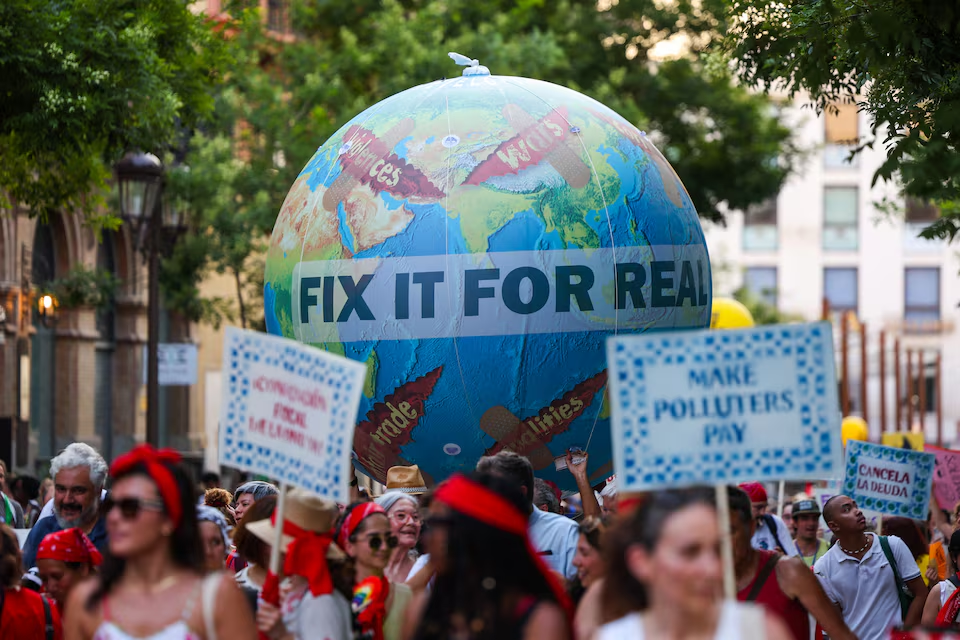Global South Rises: Protesters Demand Debt Cancellation as UN Summit Confronts ‘Broken’ Financial System (Seville 2025)

PHNOM PENH, Cambodia—July 1, 2025— As world leaders gather in Seville, Spain, for the Fourth International Conference on Financing for Development (FfD4), a powerful and unified voice from the Global South is rising outside the conference halls. Protesters, representing over a thousand civil society organizations from 114 countries, are demanding urgent debt cancellation and a fundamental overhaul of a “broken global financial system” they argue is actively undermining efforts to achieve climate justice and sustainable development.
Dignity, Not Handouts”: Global South Rises at UN Summit, Demanding Urgent Debt Cancellation to Tackle Climate Crisis
The FfD4 summit, a decadal meeting spanning June 30 to July 3, 2025, aims to shape a renewed global framework for financing sustainable development. 1 However, for activists and many Global South nations, the discussions inside feel disconnected from the stark reality on the ground: a deepening Global South debt crisis that is inextricably linked to the escalating climate emergency. Their message is clear: “Dignity, not handouts.”
The Roar from Seville: Unpacking the Protesters’ Urgent Demands
From the vibrant streets of Seville, the collective cry is unmistakable. Spearheaded by organizations like ActionAid International, alongside a coalition of more than 1,100 civil society organizations (CSOs) united under the banner “We Stand with Billions, Not Billionaires,” the protests embody a deep frustration with the status quo.
Their primary demand is urgent debt cancellation for Global South countries. Data paints a grim picture: more than three-quarters of all low- and lower-middle-income nations are spending more on servicing their debts than on essential public services like healthcare and education. This crippling financial burden, activists argue, diverts vital resources away from critical investments in climate adaptation, renewable energy infrastructure, and disaster preparedness, pushing climate-vulnerable nations deeper into a vicious cycle.
“As we marched, we made it clear that the time for empty rhetoric is over; the world needs action on ending the debt and climate crisis,” stated Arthur Larok, Secretary-General of ActionAid, during the protests. “We urgently need to overhaul and transform the current global financial system, which is no longer fit for purpose.”
Beyond mere relief, the protesters are calling for systemic financial reform. This includes calls for taxing the super-rich and multinational corporations to generate equitable revenue for development and climate action. A crucial, long-standing demand is the establishment of a legally binding UN Sovereign Debt Convention—a fair, transparent, and impartial framework for debt resolution, as opposed to existing ad hoc processes often criticized for favoring creditors.
The Debt-Climate Trap: Why Financial Burdens Are Blocking Green Progress
The link between the Global South debt crisis and the ability to fight climate change is stark. Developing countries, often least responsible for historical emissions, bear the brunt of climate impacts. Yet, their financial hands are tied.
“Many Global South countries now spend five times more on debt repayments than on climate action,” notes Roos Saalbrink, Global Lead on Economic Justice at ActionAid. This staggering disparity means less investment in resilient infrastructure, early warning systems, and green technologies.
A significant point of contention is the nature of “climate finance” itself. While developed nations make pledges, a substantial portion often comes in the form of loans, creating new debt burdens for countries already struggling. For example, despite the COP29 outcome aiming for $300 billion in annual climate finance by 2035, critics point out it falls far short of the estimated $1.3 trillion needed and heavily relies on loan-based and private capital, not grant-based funding crucial for debt-laden nations. In 2023 alone, emerging and developing economies paid a staggering $385 billion in debt service.
The narrative is clear: how can a nation prepare for rising sea levels, devastating droughts, or extreme weather events when its treasury is drained by interest payments to international creditors?
The Seville Commitment: A Step Forward or More Broken Promises?
Inside the FfD4 summit, discussions have led to the adoption of the “Compromiso de Sevilla” (Seville Commitment), an intergovernmentally negotiated outcome document intended to lay the foundation for a renewed global framework for financing development. UN Secretary-General António Guterres, in his opening remarks, acknowledged the systemic debt crisis and stated that the document is a “global promise to fix how the world supports countries.” He highlighted commitments to address the $4 trillion financing gap for the Sustainable Development Goals (SDGs), tackle debt challenges, and reform the international financial architecture.
The “Compromiso de Sevilla” notably includes commitments to engage constructively in negotiations for a UN Framework Convention on International Tax Cooperation and acknowledges the importance of public debt sustainability. It also asserts that multinational companies should be taxed “where economic activity occurs.”
However, civil society groups and many Global South delegates greet these commitments with cautious optimism, if not outright skepticism. They point to significant political obstacles that marred the preparatory process and continue to cast a shadow over the summit’s ambition:
- US Withdrawal: The decision by the United States to withdraw from the FfD4 process entirely prior to the summit has been seen as a significant blow to multilateral consensus and ambition.
- Resistance to Debt Convention: Wealthy nations, including the US, EU, and UK, have been accused by civil society organizations of actively “obstructing efforts to organize a UN convention on sovereign debt,” protecting creditor interests over comprehensive, debtor-friendly solutions. Guterres himself hinted at “resistances” to systemic change.
- Weakened Language: Critics argue that the language in the “Compromiso de Sevilla” has been watered down during negotiations, particularly concerning concrete mechanisms for debt restructuring and legally binding commitments. Civil society emphasizes that without a robust, impartial mechanism like a UN Sovereign Debt Convention, promises of reform might remain “empty rhetoric.”
Beyond Seville: The Fight for a Fairer Financial Future
As the FfD4 summit concludes on July 3, 2025, the underlying debt crisis solutions and the pursuit of economic justice for climate-vulnerable nations will continue far beyond Seville’s formal proceedings. The calls for a legally binding UN Sovereign Debt Convention will persist, aiming to shift from ad hoc, often biased, debt restructuring to a more equitable and transparent process.
The momentum for tax justice, ensuring multinational corporations and the super-rich pay their fair share, also remains strong as a crucial source of additional development finance. Failure to address these systemic issues means continued suffering for billions, delayed progress on the Sustainable Development Goals (SDGs), and exacerbating the global climate crisis.
Despite the political headwinds, the unified and vocal protests in Seville, combined with consistent advocacy from Global South leaders and civil society, signal an unyielding determination for systemic change. The “broken financial system” is under intense scrutiny, and its repair is not merely an economic imperative but a moral one, essential for a just transition to a sustainable global future.
What are your thoughts on the demands for debt cancellation and financial reform at the UN summit? Do you believe the “Compromiso de Sevilla” will deliver meaningful change for the Global South and accelerate climate action? Share your perspective in the comments below!



